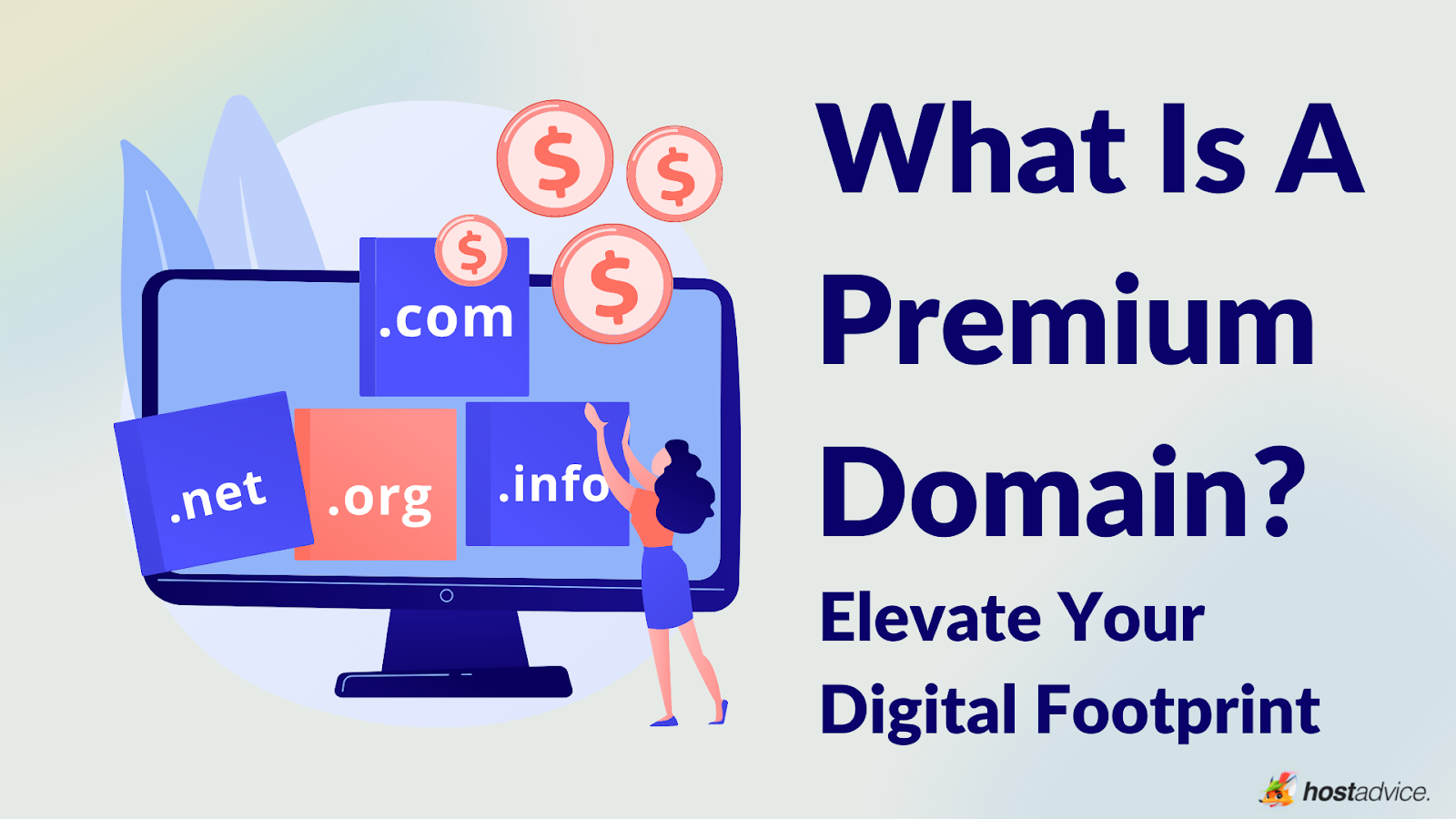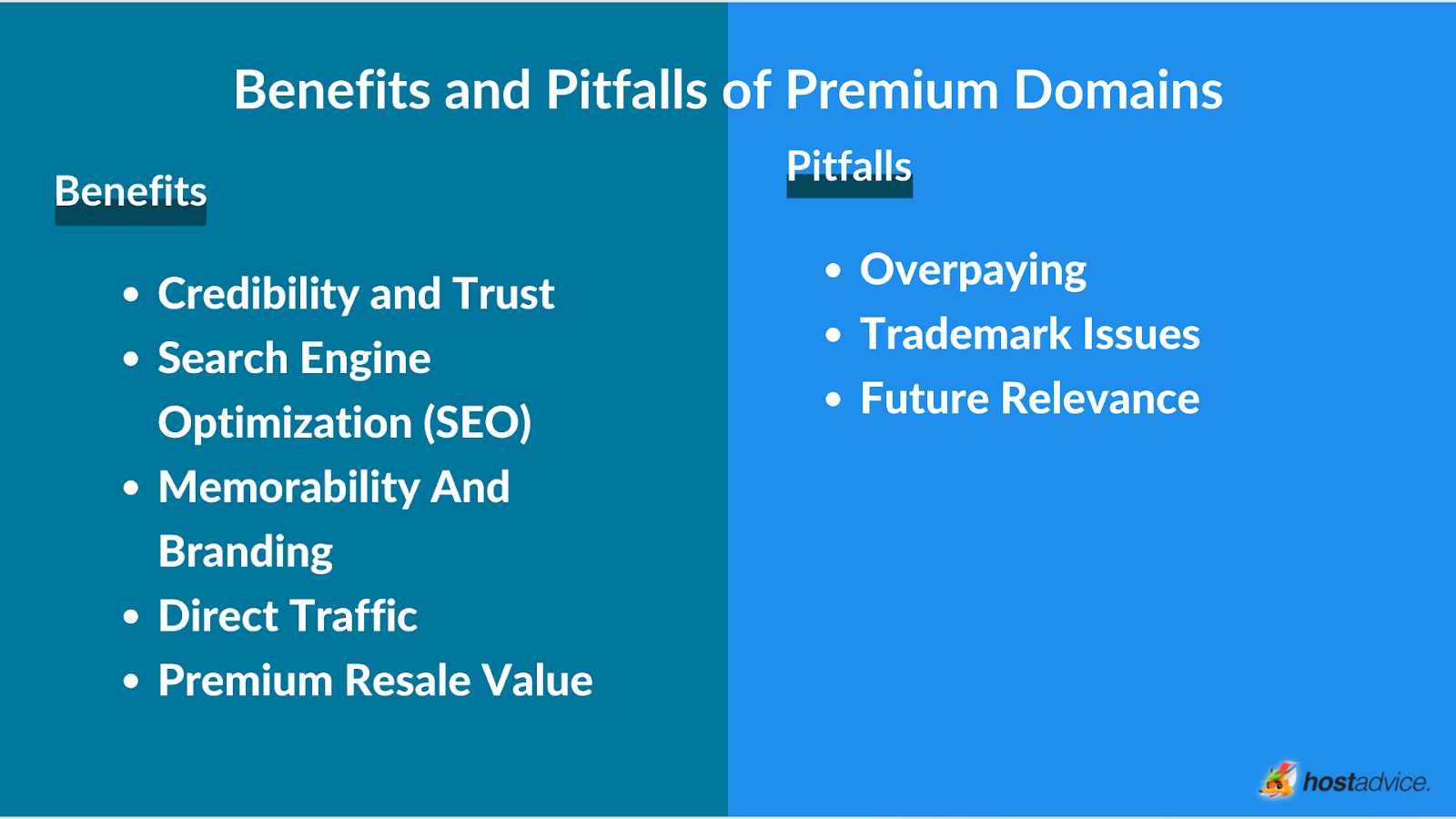
A premium domain is a type of domain name that is short, easy to spell, and easy to remember. Premium domains are more accessible to users and often appear more legitimate. Since they are memorable, users are more likely to visit premium domains.
In this article, we’ll delve into premium domains and explore their unique attributes that can elevate your brand’s digital footprint and your website.
Let’s examine the ins and outs of premium domains and why they matter in today’s digital landscape.
- Premium domains offer distinct advantages, but they also come with potential challenges
- Investing in a premium domain can offer significant advantages for your online presence
- Premium domains come in various types, each with unique attributes contributing to their value and appeal
- The value of a premium domain is determined by a combination of factors that contribute to its appeal, relevance, and potential impact on branding
- Prioritize domains that align with your business goals, and use escrow services for secure transactions
What Is a Premium Domain?
A premium domain is a web address that is considered more valuable than standard domains due to its unique and memorable qualities. These domains are often shorter, keyword-rich, and carry a higher price tag compared to regular domains.
Premium domains are sought after for their potential to enhance brand recognition, search engine visibility, and overall online presence. They are typically acquired through domain marketplaces or specialized brokers and can command prices ranging from hundreds to millions of dollars, depending on their perceived value and demand.
Premium domain are seen as strategic investments for businesses and individuals aiming to establish a strong and credible online identity.
Is It Worth Paying for a Premium Domain?
Yes, investing in a premium domain is worth it. They often make for more popular web addresses and give you the edge over your competitors. Although the upfront cost might be high, there are many short and long-term benefits, including:
- Increased brand recognition
- Improved search engine visibility
- Enhanced credibility
For many businesses, investing in a premium domain and web hosting is non-negotiable. An example of these is big companies that need credibility and must avoid their customers mistaking their domain for a similar, shorter one.
How Does a Domain Become Premium?
A domain becomes premium based on factors that enhance its value and desirability. Premium domains often possess concise length, keyword relevance, and memorable qualities. These domains are more likely to align with specific industries or popular search terms. These features make them attractive to potential buyers.
The domain extension (such as .com, .net, or .org) can also contribute to its premium status. As demand for such domains increases, their value may appreciate over time.
Learn more about popular types of domain extensions.
What Is the Difference Between a Domain and a Premium Domain?
The distinction between standard and premium domains lies in their unique attributes and perceived value. While a standard domain serves as a basic web address, a premium domain possesses qualities that set it apart.
Premium domains often include keywords relevant to specific industries or popular search terms. This feature makes them more memorable and aligned with user intent. Their concise nature and potential for strong branding contribute to their elevated value.
In contrast, a standard domain might lack these distinguishing features and could have a less significant impact on your brand’s digital presence.
Are you confused about the relationship between domain and hosting? Check our detailed article on the difference between domain and hosting here.
Benefits and Pitfalls of Premium Domains

Premium domains offer distinct advantages, but they also come with potential challenges. Understanding both sides can help you make informed decisions for your online presence.
Benefits of Premium Domains
- Credibility and Trust: A premium domain goes beyond its technical function – it psychologically impacts user perception. A concise and relevant domain name immediately establishes trust and credibility, enhancing your brand’s authority in the digital landscape.
- Search Engine Optimization (SEO): Your domain name plays a role in search engine rankings and click-through rates (CTR). A premium domain, often containing keywords, can contribute to higher CTR and improved visibility on search engines.
- Memorability and Branding: Premium domains are designed to be memorable, fostering strong brand recall. They leave a lasting impression on users, making them more likely to remember and revisit your website.
- Direct Traffic: Premium domains can attract direct traffic, where users type the domain directly into their browsers. This behavior indicates a strong brand presence and user familiarity.
- Premium Resale Value: Purchasing a premium domain is an investment that can yield substantial returns. If the domain becomes more valuable over time, you can sell it for a higher price than what you paid.
Potential Pitfalls of Premium Domains
- Overpaying: The allure of a premium domain can lead to overpaying, especially if you haven’t thoroughly researched its value. Conduct comprehensive appraisal and research before making a purchase.
- Trademark Issues: Ensure your chosen premium domain doesn’t infringe upon existing trademarks. Legal conflicts can be time-consuming and costly.
- Future Relevance: Consider the long-term relevance of the premium domain. Will the keywords and branding remain significant in your industry as trends evolve? Investing in a domain with lasting value is crucial.
Navigating these benefits and potential pitfalls can help you decide whether a premium domain aligns with your brand’s goals and resources.
What Are the Types of Premium Domains?

Premium domains come in various types, each with unique attributes that contribute to their value and appeal. Understanding these types can help you choose the right domain for your brand and online strategy.
Exact-Match Domains
An exact match domain mirrors a relevant keyword or phrase related to the website’s content or business. These domains have the power to enhance search engine rankings by aligning with user search queries. As a result, they have more domain relevancy.
Successful websites that leverage exact-match domains gain a competitive edge and establish authority within their niches. Consider websites like “TravelGuides.com†or “HealthyRecipes.net,â€. These websites directly convey their offerings and resonate with users seeking specific content.
Short and Memorable Domains
Short and memorable domains hold immense value due to their ease of recall and ability to make a lasting impression on users. These domains often result in the following:
- Higher user engagement
- Improved word-of-mouth marketing
- Increased direct traffic
Businesses that utilize short and memorable domains, such as “Apple.com†and “Nike.com.â€. These brands capitalize on brand recall and easy sharing, contributing to their online success.
Keyword-Rich Domains
Keyword-rich domains incorporate relevant keywords into their names, potentially boosting search engine visibility.
However, finding the right balance between keyword inclusion and brand identity is crucial. Industries like “FitnessEquipment.com†benefit from keyword-rich domains. They attract targeted audiences searching for specific products or services, enhancing SEO performance.
Brandable Domains
Brandable domains go beyond keywords, emphasizing uniqueness and creativity and representing a brand’s values and identity. These domains provide flexibility to accommodate business growth, diversification, and changing market trends.
Well-known brands like “Etsy.com†and “Shopify.com†showcase their successful brand identity integration into their domain names. The benefits of this approach include enhanced recognition, recall, and a strong online presence.
Historical or Legacy Domains
Historical or legacy domains hold significance due to their recognized history or previous association with popular websites. Owning such a domain can convey established authority and trustworthiness. These benefits are pronounced within the website’s particular industry or niche.
These domains often have a story to tell and can tap into the existing user base. Businesses seeking to align with their historical context can benefit immensely from this domain type.
Factors Influencing Premium Domain Value

The value of a premium domain is determined by a combination of factors that contribute to its appeal, relevance, and potential impact on branding.
These factors collectively shape a premium domain’s value and impact. Careful consideration of these elements can guide your selection of a domain that aligns with your brand’s goals and online strategy.
Domain Length and Clarity
The length of a domain name can significantly impact user experience and brand recognition. Shorter domain names are more valuable due to their ease of typing, sharing, and memorability.
Brands like “Google.com†and “Amazon.com†have harnessed the power of brevity. As a result, their domains are easily memorable and effortlessly shareable.
Keywords and Relevance
The relationship between domain keywords and content relevance is a crucial factor. Keyword-rich domains align with user intent and often lead to improved search engine rankings.
Domains like “TravelGuides.com†immediately convey their purpose, enhancing their value and attracting users seeking relevant information.
Domain Extension
Choosing a top-level domain (TLD) extension, such as .com, .net, or .org, is pivotal in domain value. While various TLDs exist, .com domains are perceived as more valuable and credible. They are familiar and synonymous with the internet.
Specific TLDs can also be appropriate for certain types of businesses or organizations. For instance, a non-profit might opt for .org to convey its purpose.
Brand Potential
Good domain names hold immense creative potential for branding. A domain’s brand potential is tied to its memorability, uniqueness, and ability to represent a brand’s identity effectively.
Memorable domains like “Coca-Cola.com†or “Nike.com†encapsulate the brand’s essence. These domains contribute to strong brand recall and recognition. Successful companies strategically leverage domain names to establish a robust online brand presence.
Understanding these factors is crucial when assessing the value of a premium domain. Each element contributes to a domain’s overall worth and impact on your brand’s digital strategy.
Acquiring and Investing in Premium Domains
Acquiring and investing in premium domains can be a strategic move to enhance your online presence and brand recognition. Here’s a guide to navigating the process effectively:
Where to Buy Premium Domains: Domain Marketplaces and Auctions
Domain marketplaces and auctions provide platforms for buying and selling premium domains. These platforms connect domain sellers with potential buyers. They also facilitate transactions ranging from a few hundred to millions of dollars.
Popular domain marketplace platforms include:
- Sedo
- Flippa
- GoDaddy Auctions
Learn more about the Best Places to Sell Domain Names for Profit
Participating in domain auctions involves placing bids on desired domains, with the highest bidder winning the domain. Research the domain’s history, traffic, and potential trademarks to navigate these platforms effectively.
Prioritize domains that align with your business goals, and use escrow services for secure transactions.
Domain Appraisal
Professional domain appraisal services and online valuation tools are essential when assessing a premium domain’s value. Appraisal services provide expert evaluations based on domain length, keywords, extension, and market demand.
Online valuation tools offer estimates, helping you gauge a domain’s potential worth. Understanding the valuation process is crucial. Factors like keyword relevance, brand potential, and comparable sales influence a domain’s value.
Price Negotiation
Negotiating the price of a premium domain requires strategic communication and research.
- Begin by researching comparable domain sales to establish a reasonable price range
- Present your offer professionally and be prepared to justify your valuation
- Understand that domain sellers might have emotional or strategic reasons for their pricing
- Be willing to compromise while ensuring the price aligns with the domain’s value to you
- Effective negotiation can lead to a favorable deal, potentially saving you money while securing a valuable premium domain
Acquiring and investing in premium domains demands thorough research, an understanding of valuation, and effective negotiation skills. By mastering these aspects, you can make well-informed decisions contributing to your brand’s online success.
Examples of Premium Domains
Premium domains are highly valued for attracting targeted traffic and enhancing branding and business goals. Let’s look at some examples to further illustrate this concept.
Insurance.com
Insurance.com, is a prime example of a premium domain. This domain is considered premium due to its high-value keyword “insurance.†It is highly sought after by people looking for insurance-related information or services.
Its potential to attract targeted traffic makes it a valuable asset for businesses in the insurance industry.
LuxuryVillas.com
Another example is LuxuryVillas.com, which combines the descriptive keyword “luxury villas†with a commonly used extension (.com). This domain is highly sought after by luxury travel or real estate businesses for its ability to establish a memorable online presence.
TechGuru.net
Techguru.net is another premium domain that utilizes relevant keywords and an extension to attract tech enthusiasts or professionals seeking advice. Despite not being a .com domain, it showcases the use of a popular extension and relevant keyword, “tech guru,†to enhance its value.
FitnessPro.org
Lastly, FitnessPro.org is a premium domain that utilizes the clear and concise keyword “fitness pro†to denote expertise in the fitness field. Its use of the .org extension further indicates that this domain might belong to an organization or professional in the fitness industry.
These examples demonstrate how premium domains utilize keywords, extensions, and industry relevance to enhance their value and impact. Each domain reflects a strategic choice that aligns with specific branding and business goals.
Conclusion
Premium domains emerge as powerful assets for businesses and individuals. Their concise nature, keyword relevance, and memorability enhance brand recognition and user engagement.
However, it’s important to note that owning a premium domain is not a guaranteed path to online success. To maximize the benefits of a premium domain, aligning it with a professional website and effective SEO strategies is essential.
Next Steps: What Now?
As you consider the potential of a premium domain for your digital strategy, here are some practical next steps to consider:
- Shared Hosting Domain: Explore the ideal hosting solution that complements your premium domain and supports your online ventures.
- Domain Extensions: Delve deeper into the world of domain extensions to make informed decisions about the best fit for your brand.
- Price a Domain: Learn how to price your own domain to get the highest ROI
- Generating a Domain Name : Check out the best domain name generators
How to Get a Free Domain Name: 3 Proven Methods
What Is a Domain Name? A Beginner’s Guide
What is Second Level Domain? Choosing and Utilizing Your Web Identity
Types of Domains: Benefits, Examples and How To Choose One
Business Domain Name: Definition & How to Choose One
The 10 Best Domain Name Generators
Fully Qualified Domain Names (FQDNs) Explained
What Is a Parked Domain: Examples & How to Buy One
Domain vs Hosting: Key Differences & How They Work Together
What Happens to Expired Domains? Exploring Their Journey and Destiny
Hostname vs. Domain Name: What’s the Difference?
Domain vs. URL: Definition and Key Differences
Domain Name Management: Everything You Need to Know
AWS Domain Name: How to Register with Route 53
What Is an Apex Domain? A Handy Guide for Beginners
What Was the First Ever Registered Domain Name?
How to Host Multiple Domains on One Server?
Can You Trademark a Domain Name? What You Need to Know
What Is a Custom Domain: Benefits (& How to Get One)
What Is Domain Alias & How to Create One in Control Panels?
What Separates the Components of a Domain Name?
What Is Domain Forwarding and How to Use It for Your Website?
Aged Domains: Unlocking the Power of Established Online Identity
What Is an Addon Domain and Why Is It Important?








